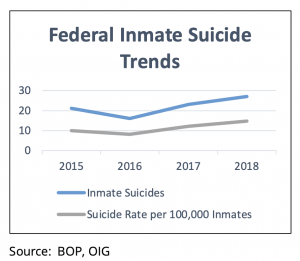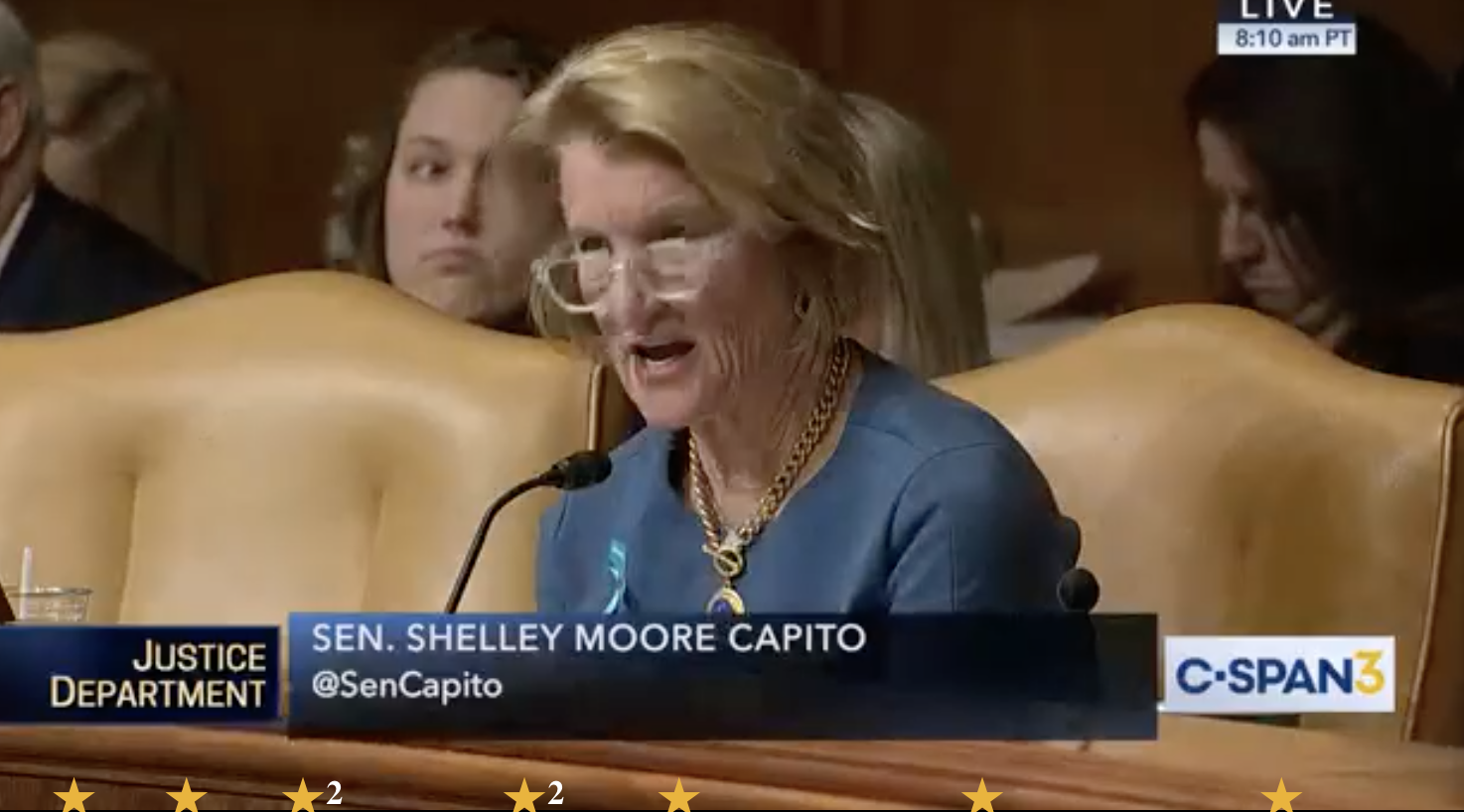Bill Barr Moves from Treating Understaffing at BOP as a “SNAFU” to a “Perfect Storm of Screw-Ups”
In its annual review of management and performance challenges, DOJ’s IG listed “Managing a safe, secure, and human prison system” first among all challenges, bumped up two positions and significantly expanded from where challenges running the Bureau of Prisons occupied in that report last year.
After listing contraband — including phones like the one Joshua Schulte allegedly used to leak more CIA secrets from MCC or the one an inmate used to arrange a guard’s murder — the report then focuses on BOP’s outdated cameras, inadequate monitoring, and insufficient staffing. While all three factored in Jeffrey Epstein’s ability to kill himself, the inmate monitoring section mentions the deaths in custody of both Epstein and Whitey Bulger, while showing that those two famous prisoners were part of a trend of less notorious prisoners.
In addition to the issues relating to security cameras, the BOP also faces challenges ensuring that its correctional officers monitor inmates at required frequencies and in accordance with policies to protect inmates, including reducing the risk of inmate homicides and suicides. From FY 2015 through July 2019, the BOP has experienced 46 inmate deaths by homicide and 107 inmate deaths by suicide, including the deaths of high-profile inmates, James “Whitey” Bulger and Jeffrey Epstein. Inmate deaths by suicide in BOP facilities have increased from 8.1 per 100,000 federal inmates in FY 2016 to 14.7 per 100,000 inmates in FY 2018. The OIG is currently investigating several recent inmate homicide and suicide deaths, including those of Bulger and Epstein, to assess any systemic issues that they present, and to ensure that BOP staff are conducting consistent and appropriate monitoring of the inmates in BOP custody to ensure their physical safety.
In short, the IG identified several of the factors that contributed to Epstein’s death to be among the most urgent problems facing DOJ.
Of course, all that was not just knowable, but known, months before Epstein’s death. As I noted at the time, four months before Epstein’s death, Republican Senators Shelly Capito raised concerns about BOP staffing levels, citing several deaths in West Virginia’s Hazelton prison, where Bulger was killed. At the time, Barr brushed off Capito’s question about budget cuts by calling it a SNAFU.
In response to a question from a Republican Senator about these issues, the Attorney General admitted failure. “I think this is an area where we have stumbled.” Rather than answering Senator Capito’s question about the budget, though (again, this was an Appropriations hearing), he instead explained that the problem wasn’t budget, it’s that the BOP doesn’t have all its assigned slots full because of how it hires.
I’ve been looking into this because it’s been very frustrating to me because I’ve always supported Bureau of Prisons in the past and think it’s a great organization and if we’re going to have people incarcerated we have to make sure they’re incarcerated under proper conditions. We are — The way I look at it our authorized level is good and adequate. It’s that we’re four to five thousand people short of our authorized level.
Barr went on to provide evidence of a systematic underlying problem. “Every year we lose 2,600 of these correctional officers.” Without considering why turnover in the BOP is so high, he instead offered this solution. “My view is we just have to turn on the spigot and just keep these new entry level people coming in at a rate where we’re going to be able to get up to and maintain our enacted level. So I think this is largely a SNAFU by the department.”
Today, the AP has an interview (conducted on a flight to Montana) with Barr, in which he tries to assure the public that Epstein really did just kill himself by explaining that he, personally, reviewed the security footage, just like he claimed to have read the Mueller Report.
The attorney general also sought to dampen conspiracy theories by people who have questioned whether Epstein really took his own life, saying the evidence proves Epstein killed himself. He added that he personally reviewed security footage that confirmed that no one entered the area where Epstein was housed on the night he died.
He calls the several known factors that contributed to Epstein’s ability to kill himself “a perfect storm of screw-ups.”
Attorney General William Barr said he initially had his own suspicions about financier Jeffrey Epstein’s death while behind bars at one of the most secure jails in America but came to conclude that his suicide was the result of “a perfect storm of screw-ups.”
That he calls these “screw-ups” didn’t prevent his DOJ from filing a six count indictment this week against the guards on duty the night Epstein died, Michael Thomas and Tova Noel, an overarching conspiracy charge along with false records charges for each of five prisoner checks one or both of them had claimed to have done that night, but did not.
It’s an odd indictment.
It shows that in addition to Thomas and Noel, two other guards filed false records, one — along with Noel, for a 4PM prisoner check during which Epstein wasn’t even on the floor — and another –again with Noel, for a 10PM check.
Furthermore, there’s no evidence that they failed to complete the checks because they were trying to facilitate suicide. Indeed, Thomas is described as one of the guards who had found Epstein before his earlier suicide attempt succeeded on July 23. More importantly, when Epstein was found dead (the indictment is very unclear about who first found him, though the implication is Thomas was), both defendants immediately admitted they hadn’t done their job.
NOEL told Supervisor-1 “we did not complete the 3 a.m. nor 5 a.m. rounds.” THOMAS stated, “we messed up,” and “I messed up, she’s not to blame, we didn’t do any rounds.”
Additionally, there’s no time of death in the indictment, leaving open the possibility that Epstein died before Thomas came on shift at midnight, meaning one of the other guards would be the other responsible party.
While the conspiracy charge relies, in part, on a ConFraudUs argument — effectively arguing that by making false records claiming they had done their rounds, they impaired the lawful function of the government, the indictment also alleges they intended to impair “the investigation or proper administration” of government.
Sure, they impaired their supervisor’s ability to bust them for slacking (and, for two hours, literally sleeping) on the job. Sure, they impaired an escalating bed check system that was unnecessary in any case to find Epstein.
It’s certainly possible that the government suspects there’s more to this, that Thomas, having been involved in thwarting Epstein’s first suicide, he got recruited to facilitate his second one. It’s possible the government is suspicious about the fact that Noel walked up to the door of Epstein’s unit around 10:30PM. Certainly, by larding on six charges, they’re holding an axe over the guards’ heads to make them plead out quickly. Though there’s no reason to believe either one of them was involved in the more important failure, to make sure Epstein had a cellmate who could have called guards right away.
But as presented, the evidence presented in this indictment suggests not so much a conspiracy to make it easier for Epstein to kill himself, but instead, a conspiracy — one involving other guards on the SHU that night — to cut corners to make their thankless job easier. Part of that seems driven the pay and understaffing leading guards to take taxing overtime shifts; both defendants were working an overtime shift that night, with Noel working 16 hours straight that day.
I don’t mean to apologize for the defendants for behavior that, with several other factors, created the opportunity for Epstein to kill himself.
Rather, I mean to highlight how the grunts in this story are being threatened with long prison sentences, while the guy (once again) watching videos himself rather than fixing the systemic problems gets away with calling it “a perfect storm of screw-ups.”



